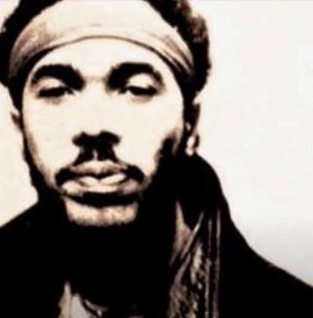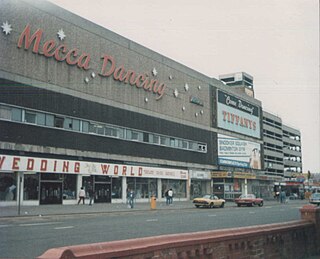House is a genre of electronic dance music characterized by a repetitive four-on-the-floor beat and a typical tempo of 115–130 beats per minute. It was created by DJs and music producers from Chicago's Black gay underground club culture and evolved slowly in the early/mid 1980s as DJs began altering disco songs to give them a more mechanical beat. By early 1988, House became mainstream and supplanted the typical 80s music beat.
Chicago house refers to house music produced during the mid to late 1980s within Chicago. The term is generally used to refer to the original house music DJs and producers from the area, such as Ron Hardy and Phuture.

Lawrence Philpot, known as Larry Levan, was an American DJ best known for his decade-long residency at the New York City night club Paradise Garage, which has been described as the prototype of the modern dance club. He developed a cult following who referred to his sets as "Saturday Mass". Influential post-disco DJ François Kevorkian credits Levan with introducing the dub aesthetic into dance music. Along with Kevorkian, Levan experimented with drum machines and synthesizers in his productions and live sets, ushering in an electronic, post-disco sound that presaged the ascendence of house music. He DJ'd at Club Zanzibar in the 1980s as well, home to the Jersey Sound brand of deep house or garage house.

Ron Hardy was an American, Chicago, Illinois-based DJ and record producer of early house music. He is well known for playing records at the Muzic Box, a Chicago house music club. Decades after his death, he is recognized for his innovative edits and mixes of disco, soul music, funk and early house music.

Paradise Garage, also known as "the Garage" or the "Gay-rage", was a New York City discotheque notable in the history of dance and pop music, as well as LGBT and nightclub cultures. The 10,000 square feet (930 m2) club was founded by sole proprietor Michael Brody, and occupied a building formerly located at 84 King Street in the SoHo neighborhood. It operated from 1977 to 1987 and featured resident DJ Larry Levan.

Northern soul is a music and dance movement that emerged in Northern England and the Midlands in the early 1970s. It developed from the British mod scene, based on a particular style of Black American soul music with a heavy beat and fast tempo.
In popular music, a break is an instrumental or percussion section during a song derived from or related to stop-time – being a "break" from the main parts of the song or piece. A break is usually interpolated between sections of a song, to provide a sense of anticipation, signal the start of a new section, or create variety in the arrangement.
Francis Grasso was an American disco music disc jockey from New York City, best known for being one of the first people to beatmatch.
The Essential Mix is a weekly radio show on BBC Radio 1 currently broadcast between 0:00 and 2:00 a.m. UK time on Saturday morning. Originally broadcast on 30 October 1993, the Essential Mix features contemporary DJs and music producers of electronic dance music. The show has been presented since its inception by Pete Tong and features an uninterrupted two-hour mix from a different artist each week, overlaid with occasional continuity announcements delivered by Tong. With a broadcast run of over 30 years, the Essential Mix is one of the longest-running programmes in the current BBC Radio 1 schedule. It is one of very few Radio 1 shows which is not broadcast live.
Balearic beat, also known as Balearic house, Balearic, Ibiza house or Ibizan chillout, is an eclectic blend of DJ-led dance music that emerged in the mid-1980s. It later became the name of a more specific style of electronic dance/house music that was popular into the mid-1990s. Balearic beat was named for its popularity among European nightclub and beach rave patrons on the Balearic island of Ibiza, a popular tourist destination. Some dance music compilations referred to it as "the sound of Ibiza", even though many other, more aggressive and upbeat forms of dance music could be heard on the island, such as Balearic trance.

A DJ mixer is a type of audio mixing console used by disc jockeys (DJs) to control and manipulate multiple audio signals. Some DJs use the mixer to make seamless transitions from one song to another when they are playing records at a dance club. Hip hop DJs and turntablists use the DJ mixer to play record players like a musical instrument and create new sounds. DJs in the disco, house music, electronic dance music and other dance-oriented genres use the mixer to make smooth transitions between different sound recordings as they are playing. The sources are typically record turntables, compact cassettes, CDJs, or DJ software on a laptop. DJ mixers allow the DJ to use headphones to preview the next song before playing it to the audience. Most low- to mid-priced DJ mixers can only accommodate two turntables or CD players, but some mixers can accommodate up to six turntables or CD players. DJs and turntablists in hip hop music and nu metal use DJ mixers to create beats, loops and so-called scratching sound effects.

Last Night a DJ Saved My Life is a book written by Bill Brewster and Frank Broughton about the history of DJing published in 1999. A compilation album of the same name was released with the book. The album contains various clips ranging from 1970s reggae to Handel's Largo, the first song to reach radio airwaves, in 1906. The book takes its name from the Indeep single "Last Night a DJ Saved My Life." In 2006, The Observer named Last Night... #45 on their list of the greatest music books.
A DJ mix or DJ mixset is a sequence of musical tracks typically mixed together to appear as one continuous track. DJ mixes are usually performed using a DJ mixer and multiple sounds sources, such as turntables, CD players, digital audio players or computer sound cards, sometimes with the addition of samplers and effects units, although it is possible to create one using sound editing software.

The Blackpool Mecca was a large entertainment venue on Central Drive in the seaside town of Blackpool, Lancashire, in North West England, first opened in 1965. In the 1970s, it was particularly known for The Highland Room, which was a major Northern Soul music venue. From 1977 onwards it was also host to the Commonwealth Sporting Club. The building was closed down in 1980s and was finally demolished in January 2009 to make way for new campus buildings of Blackpool and The Fylde College. However, following an issue with funding B&FC withdrew and as of 2013 the site is planned for residential development.
Robbie Leslie was one of a small group of popular and influential disc jockeys working in the New York area, Florida, and The Coast in the 1970s, 1980s, and 1990s. Beginning his career at Fire Island's disco The Sandpiper, he moved to New York City in 1979. The list of clubs at which he regularly performed includes many well-known nightspots: Studio 54, Palladium, Underground, The Red Parrot, The Saint, and 12 West.
The Gallery was a disco in SoHo, Manhattan which was opened in February 1972 by disc jockey Nicky Siano and his older brother Joe Siano. The first location of The Gallery, located on 132 West 22nd Street, closed in July 1974. It reopened in November 1974 at 172 Mercer and Houston Streets and closed in October 1977. Famed DJs Larry Levan and Frankie Knuckles both worked at the club, but not at the DJ booth. Grace Jones and Loleatta Holloway both made their debut performances at The Gallery.
In music, the terms Afro/cosmic disco, the cosmic sound, free-style sound, and combinations thereof are used somewhat interchangeably to describe various forms of synthesizer-heavy and/or African-influenced dance music and methods of DJing that were originally developed and promoted by a small number of DJs in certain discothèques of Northern Italy from the late 1970s through the mid-1980s. The terms slow-motion disco and Elettronica Meccanica are also associated with the genre.

James Michael Burgess was a disco record producer and New York DJ of the 1970s. He was openly gay.
Colin Curtis is a British DJ whose career spans several decades and musical developments.
Alfredo Fiorito is an Argentinian DJ. He has been credited as the "Father of the Balearic beat".








